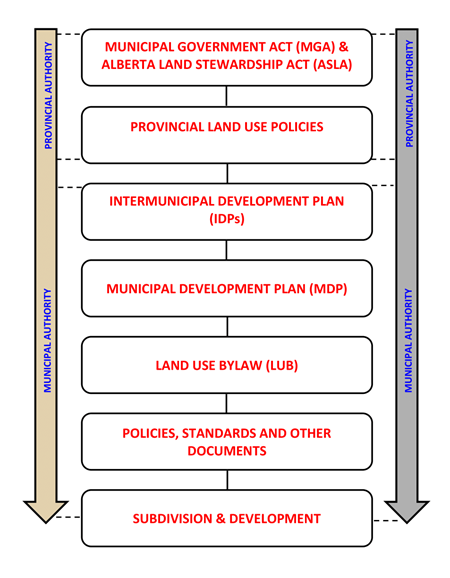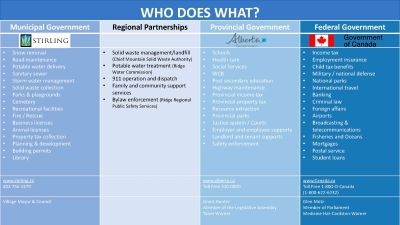Planning & Development
Planning and Development plays a central role in the change and development of our community by establishing and administering the Village of Stirling’s land use planning process. Planning and development aims to ensure orderly, economical, and beneficial development, and to maintain and improve the quality of the Village’s physical environment through the application of tools and services under the land use planning process. The scope of planning and development services include:
Land Use and Sustainability Planning
Land Use and Sustainability Planning involves the creation and administration of long-term, community vision plans, such as statutory plans (e.g., Municipal Development Plan, Intermunicipal Development Plans and Area Structure Plans), and the Land Use Bylaw, which together provide direction and the regulatory mechanism for implementing the desired change.
Development Permitting and Subdivision Planning
This includes processing and issuing decisions on development permit and subdivision applications, based on approved plans, the Land Use Bylaw, and other applicable municipal and provincial legislation.
Development Control
Development Control involves the use of tools such as Development Agreements, inspections, and Land Use Bylaw enforcement mechanisms to achieve desirable development outcomes.
Special Projects
Examples of special projects undertaken though P&D include beautification and special studies (e.g., Liquor License Survey).
Other services
These are services provided to the public for a fee outside the core planning and development services (e.g., Compliance Report or Certificate).
The Village of Stirling works closely with the Old Man River Regional Services Commission, as they provide a great deal of processes and functionality to our planning and development services.
New/On Going Projects
Up-coming Public Hearings
There are no upcoming Public Hearings.
General Inquiries
General inquiries about Planning and Development can be directed to the Development Officer at the Village of Stirling, by phone at 403-756-3379 by email at cao@stirling.ca
Land Use Planning Framework

The Village of Stirling derives its authority to make decisions on land use planning matters from the Government of Alberta though provincial legislation and regulations, including the Municipal Government Act (MGA), the Alberta Land Stewardship Act (ALSA) and the Subdivision and Development Regulation, that delegate certain powers and authority to municipalities. The Village of Stirling’s land use planning framework can be illustrated.
Together with the Province’s MGA, ALSA, Land Use Policies and Subdivision and Development Regulation, and the Village’s statutory plans, Land Use Bylaw, Policies, and other documents, the land use planning framework serves as a guide for planning, development, and subdivision within the Village of Stirling. The following is a description of and link to these documents. Some of the Village’s documents represent Office Consolidations that incorporate the original documents and subsequent amendments approved by Council by bylaw. In case of uncertainty, the reader is advised to consult the original documents, available at the Village’s municipal office.
Relationship Between Planning Documents
The hierarchy of documents within the Village of Stirling’s land use planning framework is established by the MGA. The MGA requires that each level is consistent with the level above and below it, and that the policies or regulations within planning document(s) at each level may be implemented by those below them in the decision-making process. The MGA provides the legislative authority for municipal land use planning and decision-making, while the ALSA regional plan (or Land Use Policies in their absence) provides broad-based policy directions and principles for municipal land use planning, which are effected through statutory plans and bylaws. The statutory plans provide future direction for the development and use of lands at the fringe areas of the Village’s boundaries (IDPs) or within the whole municipality (MDP). The LUB regulates the use and development of land based on the policy directions of statutory plans, while the Subdivision and Development Regulation regulates subdivision planning in conjunction with the MGA, applicable statutory plans, and the Land Use Bylaw. The policies, studies, guidelines and other documents contain additional information or specific requirements outside statutory plans and the LUB documents that are considered for certain types of development permit and subdivision applications. Where there is a conflict or inconsistency between a higher-level planning document and a lower-level planning document, the higher-level planning document prevails to the extent of the conflict or inconsistency.
Municipal Government Act
The Municipal Government Act is the key provincial legislation from which the Municipal District of Fairview No. 136 derives its authority to undertake planning and development. The MGA establishes the powers and responsibilities of Council and administration in creating policies, plans and bylaws to regulate land use and development within their municipality, to ensure orderly physical, environmental and economical beneficial development. Specifically, the MGA allows a municipality to create four (4) types of statutory plans—namely, Municipal Development Plan (MDP), Intermunicipal Development Plan (IDP), Area Structure Plan (ASP) and Area Redevelopment Plan (ARP)—and the Land Use Bylaw. These provide a framework for coordinated land use planning and decision-making. The MGA also provides municipalities with enforcement mechanisms to ensure conformity between development and approved plans and bylaws.
Alberta Land Stewardship Act
The Alberta Land Stewardship Act (ALSA) is a 2009 provincial legislation that establishes a regional approach to land use planning through the implementation of the Alberta Land-use Framework (LUF). It aims to achieve Alberta’s long-term economic, social and environmental goals through the efficient management of public and private lands and natural resources. The ALSA divides up the province into seven “land-use regions”, based on the LUF, which correspond to Alberta’s major watersheds, and contemplates a regional plan for each region. The Village of Stirling falls in the South Saskatchewan Regional Plan Area.
Provincial Land Use Policies
The province’s Land Use Policies were created in 1996 under the MGA to guide municipalities in harmonizing provincial and municipal policy initiatives at the local land use planning level. The policies establish high-level principles, such as a collaborative approach to addressing planning issues, for better land use planning. The Provincial Land Use Policies will be replaced by regional plans once in effect.
Matters Related to Subdivision and Development Regulation
Enacted in 2002 and amended in 2022, the Matters Related to Subdivision and Development Regulation outlines a number of requirements, procedures and guidelines for the referral and decision-making process on subdivision applications in Alberta, in addition to the requirements of the MGA. The Subdivision and Development Regulation prescribes the following setback distances:
- 100 metres from gas and oil wells;
- 1.5 kilometers from sour gas wells and facilities (depending on the level of the sour gas facility and the intensity of the proposed use);
- 300 metres from the working area of a wastewater treatment plant;
- 300 metres from the disposal area of an operating or non-operating landfill, or the working area of an operating storage site; and
- 450 metres from the working area of an operating landfill, the working or disposal area of a non-operating hazardous waste management facility or the working area or disposal area of an operating hazardous waste management facility.
An applicant for subdivision or development permit (except when the proposed building is less than 47 square metres) is also required by the Subdivision and Development Regulation to supply information regarding abandoned oil and gas wells on the subject parcel. If an abandoned well is identified during the application process, Alberta Energy Regulator Directive 079 (Surface Development in Proximity to Abandoned Wells) prescribes minimum setbacks and may require the applicant to contact the licensee of record.
Intermunicipal Development Plan (2020)
An Intermunicipal Development Plan (IDP) is a statutory plan prepared collaboratively between two (or more) municipalities to provide direction for the future development of the lands of mutual importance. An IDP serves as a cooperative framework for efficient land use planning and development decision-making at the interface between municipal boundaries. IDPs are adopted by the municipalities party to them through marching municipal bylaws, and contain policies that address land use, environmental matters, transportation, economic development, and intermunicipal infrastructure, services, and programs, as well as procedures for administering and amending the plan. All IDPs will have to be consistent with the ALSA Regional Plans of the Provincial Land Use Framework once those are completed.
The Village of Stirling entered their IDP with the County of Warner in May 2020 and this document can be found on the Village website and is Village Bylaw #490-20.
Municipal Development Plan
The Municipal Development Plan (MDP) was adopted by in 2008 by Council to provide a cohesive framework to guide local decision making that is necessary to achieve the Village of Stirling’s long-term vision. The MDP guides future land use, infrastructure, environmental, social and economic policy decisions in a manner that reflects the municipality’s vision. The MDP was also developed to protect the MD’s agricultural land base, rural character, and unique natural features, while promoting its tourism and development potential.
In 2021 Council began and MDP review, which is required to occur following the adoption of a new IDP. This process has had a series of community engagement sessions and should be completed in the summer of 2022.
Land Use Bylaw 549-24
The Land Use Bylaw can be described as the “rule book” for development within the Village of Stirling. It regulates the development of land and buildings on a site-specific basis, based on the policy directions set by the MDP and IDP. The LUB defines what constitutes development (or land use); divides up the municipality into land use districts and lists the land uses allowed in each district. It also separates all the land uses enabled in each district into permitted and discretionary uses; and sets the development standards (e.g., size of land and buildings, building heights, setbacks and site coverage) for each land use district. The LUB also outlines the requirements for a development permit application and timelines for decision; the process for appealing a development permit decision; and the process for amending the Land Use Bylaw.
Additional Land Use Bylaw Amendments (not in consolidated document)
Following is the list of amendments to the Land Use Bylaw that have been passed by Council but have not yet been incorporated into the consolidated Land Use Bylaw:
Amending the Land Use Bylaw
A person may apply to amend the Land Use Bylaw, in writing, to the Development Officer by completing the LUB Amendment Application Form and submitting an application fee as established by Council. All applications to amend the Bylaw shall include the following:
- A certificate of title for the subject property;
- An indication of the applicant’s interest in the subject property;
- A statement of the proposed land use change(s);
- Reasons in support of the amendment; and
- Any supporting drawings subject to the satisfaction of the Development Officer
All amendments to the Land Use Bylaw shall be made in conformity with the provisions of the MGA and any applicable statutory plans. The Village of Stirling may, at any time, also initiate an amendment to the Land Use Bylaw. For more information about the Land Use Bylaw Amendment Process please contact the Village of Stirling Administration Office at 403-756-3379 or email the Development Officer at email at cao@stirling.ca




